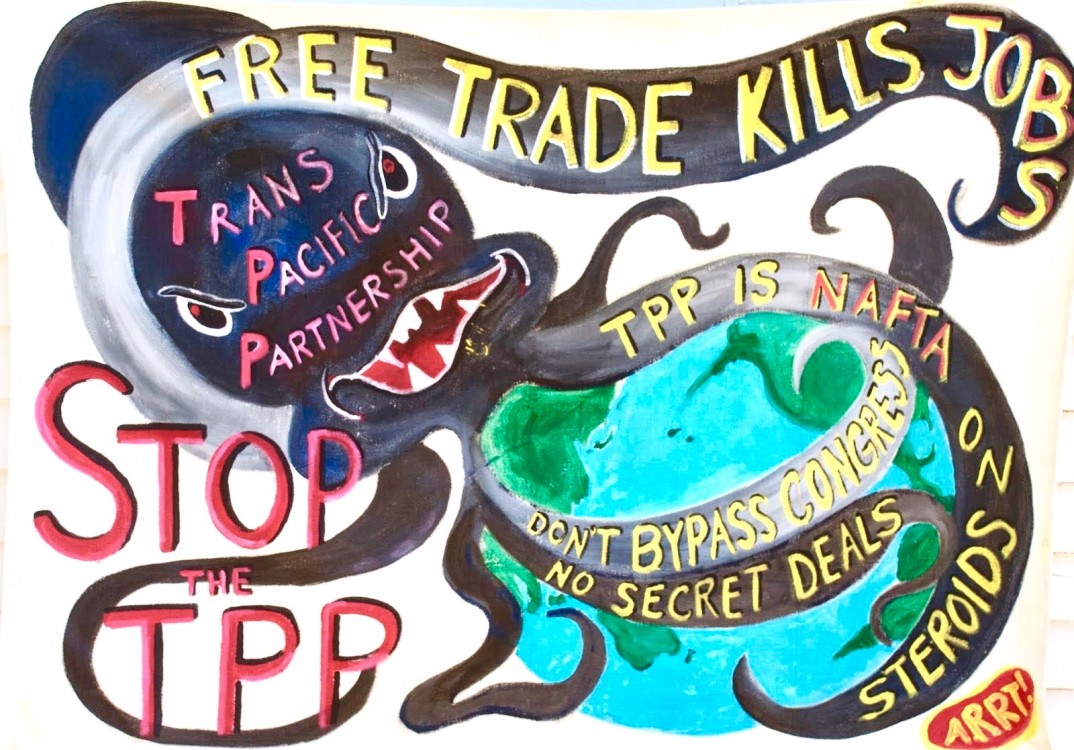
The Trans-Pacific Partnership (TPP) is taking a beating in the ongoing U.S. presidential election cycle, leaving some observers to wonder if it can survive such a political backlash against trade agreements. But as the leading candidatesseem to compete for who can bash U.S. trade policies the hardest, other countries have been pressing forward to ratify the TPP since the deal's signature in February.
In the U.S., chances are close to nil that the TPP could get ratified anytime soon. The White House is still seeking congressional support for the massive 12-country deal but the political environment could not be any more unfavorable. Presidential candidates are pointing to trade agreements as the root cause of economic inequality. For the Obama administration, things look grim in Congress as well. More and more lawmakers are coming out against the TPP, while others who had long championed the deal are now holding back their support over their stance that some of the provisions do not go far enough to protect certain industries. The soonest the TPP's ratification vote may happen is during the “Lame Duck” period after November's election.
But even as the United States stalls on the TPP, other countries are moving towards ratification. Below is a summary of how TPP is advancing outside the United States:
• New Zealand: The Minister of Commerce and Consumer Affairs released a consultation document on the implementation of the TPP's intellectual property provisions. EFF has reviewed their proposals and will submit comments. One of the most substantial issues affecting Kiwis' digital rights are the changes the government would be required to make to its DRM rules. Even though the TPP bans the circumvention of DRM, potentially even for non-copyright-infringing purposes, it was a pleasant surprise to see that the government propose very permissive flexibilities that could effectively counteract this toxic obligation. We urge other countries to emulate New Zealand in this regard, and do all they can to support user rights if they are to ratify and implement the TPP.
• Australia: Leading proponents of the TPP are seeking parliamentary approval for the TPP before the country heads into a federal election later this year, fearing increased politicization of the issue blocking its chances of getting ratified.
• Canada: Trade officials are delivering on their promise that they would consult with the Canadian people about the TPP's impacts. The parliamentary committee on trade is holding public hearings across Canada to hear from people directly and is inviting Canadians to submit written comments by the end of April. A coalition of Canadian civil society organizations have created the Let's Talk TPP platform to make it easy for anyone to send comments to state officials. (To read more about how the TPP will affect the digital rights of Canadians, see Michael Geist's blog series, "The Trouble With the TPP.")
• Japan: Prime Minister Shinzo Abe introduced some bills earlier this month to approve the agreement during the current Diet session, paving the way for the TPP to be debated by the legislature in April and possibly ratified by the summer. Sadly, one of the bills would enact the TPP's copyright term extension into Japanese law—a provision that we have vehemently opposed. There has long been a major opposition movement against the TPP in Japan, including from those protesting its copyright provisions, but more so due to powerful agricultural and industrial organizations that fear the agreement's impact on their markets. We hope that when these bills come up for debate next month, the Japanese people come out in force to stop the implementation of the TPP's restrictive copyright rules.
• Malaysia: The Senate ratified the agreement on January 28 even before the TPP signing in February, making it the first and so far only country to do so. That approval came despite opposition from thousands of Malaysians who protested in the streets. Still, the government must go through the process of implementing the actual terms of the agreement into law. It had already preemptively made some of the necessary changes to its laws in 2012, but one major remaining change is the copyright term extension. A national committee, made up of private industry and NGO representatives, has been created to oversee this process. If they will not reject the deal outright, we encourage this committee to propose copyright rules that maximize the public interest.
• Vietnam: The National Assembly has announced plans that it will approve the TPP in July of this year. The Vietnamese government says it strives for an early ratification to prove their role as "active member of the TPP" and has assigned some of its national ministries to conduct reports on the TPP's impact on Vietnam's laws.
• Peru: The Prime Minister has expressed his intention to press forward with the TPP's, but there has been vocal public opposition to the deal. Nearly 40 civil society organizations across Peru demanded that a full public debate take place in Congress before the government moves to approve it. Over the following month, there were at least five protests against the deal, one of which had over 2,000 Peruvians marching across the capital city of Lima.
The agreement itself stipulates that the TPP's provisions do not go into force until at least the U.S. and Japan both ratify the agreement. If the U.S. does ratify, it will still claim the ability to withhold benefits from other countries until their implementations are "certified" as compliant to the U.S. interpretation of the deal. We strongly urge countries to forgo TPP's implementation into their laws until at least the TPP impasse is resolved in the United States—or for that matter, to never ratify the deal at all. Many of these TPP signatories are preemptively binding their laws to an agreement that will not only undermine their people's rights to free expression, privacy, and access to knowledge on the Internet, but would also threaten innovation and creativity, potentially all in exchange for nothing.
The TPP was kept entirely secret from the public for seven years of negotiations, while powerful corporate stakeholders had the prerogative to decide its aims and objectives. We're now at the last stage when it's possible to defeat this deal. That's what happened with the Anti-Counterfeiting Trade Agreement (ACTA), which had already been completed and signed when tens of thousands of Europeans went out and protested the agreement. They couldn't be ignored, and Parliament rejected ACTA. There's hope that we can defeat the TPP too, but it will only happen if the public demands our governments do the right thing and reject its ratification.
3 WAYS TO SHOW YOUR SUPPORT
- Log in to post comments













Comments
Larry replied on
TPP - The Road to Serfdom: Global Corporate Feudalism
The TPP lays the tracks to the road to serfdom: global corporate feudalism. The "investor-state" resolution mechanism is nothing short of a global corporate "coup" that will both override any local, state or national labor, environmental, health & safety regulations, anything that threatens "prospective" corporate profits. "Damages" to prospective corporate profits will be paid from the respective local, state and national treasuries—destroying any semblance of functional democracy.
barb and speedy replied on
TPP and TPA
I would very much appreciate a non legalistic explanation of both trade deals...where did they start from? Who wrote them? Exactly what are the pros and cons? Who benefits?...........Also, I am appalled to learn that our elected Representatives take bribes to pass or defeat legislation. Why is this information not in headlines and on the nightly news? They should be recalled. All of them.